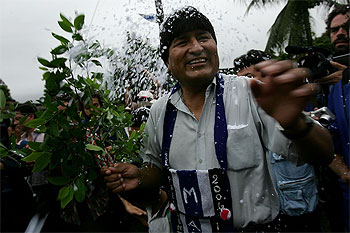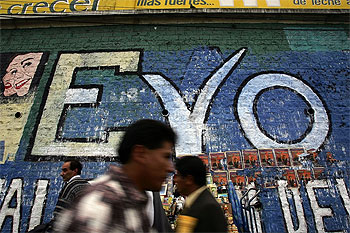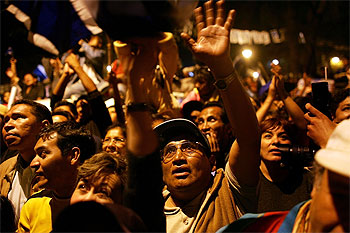 |
 | ||||||||||
Bolivia Rising
|
 |
|||||||||
|
Evo Morales was late and the miners were starting to light off fireworks. Staunch supporters in the leftist Indian's candidacy for the presidency of Bolivia, the miners hold the front line of thousands who had turned out on this cool and drizzly La Paz evening to hear Apu Mallku, or Supreme Leader, speak about the revolution he was fomenting in this Andean nation. In their beat-up brown helmets festooned with stickers of Che and Morales's party MAS (Movement Towards Socialism) the miners make a convincing presence of genuine conviction. There are no campaign handlers at this event and surprisingly little in the form of security for a man who is making headlines from Washington to Rome. But as night sets in and the speakers gradually grow in importance a festive-like atmosphere emerges. As Evo finally takes the stage, adorned with a necklace of flowers and brandishing a knightly staff, fireworks light up the sky over La Paz, as if to warn those near and far that Bolivia is rising.
Morales, or "Evo" as he is genuinely called, is a hard figure to dislike. In an age where politicians are increasingly supercilious and reserved Morales enjoys coming to a table of press photographers, or paparazzi as he sarcastically refers to us, and sharing a beer. The stocky former coca-farmer leader has a simple, almost unsophisticated, manner about him. An admirer of Che Guevara, Castro and, to the chagrin of Washington, Hugo Chavez, Morales has sent shivers through the corridors of Washington. His revolutionary platform calls for a legalization of coca growing and for the nationalization of Bolivia's natural resources - a longstanding issue in this country that has an abysmal history of exploitation of the over 60 percent of Bolivians of Indian descent.
The Bush administration views Morales as part of a creeping leftist threat in Latin America. As America has been preoccupied with the Middle East, numerous countries in the region have witnessed the rise of left-wing and indigenous movements that often advocate policies at odds with Washington. Shifts in Ecuador, Mexico, Brazil and now Bolivia away from the blind endorsement of globalization and free-market policies have sent a message to decision-makers in the United States that Latin America is no longer willing to deferentially endorse whatever America prescribes for the continent's woes.
Covering a presidential election in Bolivia is not entirely different from life on the campaign trail in America. There are the musty press buses, bad lunches, candidate photo-ops and late-night scrambles for hotel rooms in provincial towns. But what is unique is a feeling of political authenticity. With few handlers and a limited amount of scripted moments, covering a candidate like Morales offers a journalist a glimpse into what it must have been like to cover politics in the era of Kennedy or Roosevelt, a period of larger-than-life men, advocating bold ideas and in whom people genuinely bestowed their hope.
In my months on the trail with John Kerry I never once had a moment like the morning in Villa 14 de Septiembre, Morales hometown. After the press was fed a breakfast of trout, potatoes and a tepid malt drink the entire village lined up to salute their local hero. Women broke down in tears and kissed the candidate while flowers and confetti were thrown onto him in a kind of hysterical frenzy. It was not so much a campaign stop as a ritual ceremony for one about to be dispatched off to battle giants and conquer foreign lands.
Evo Morales would convincingly win the presidential election the following week and Bolivia would be sent on yet another adventure. To be continued ...
© Spencer Platt
Dispatches are brought to you by Canon. Send Canon a message of thanks. |
||||||||||
Back to January 2006 Contents
|
|



